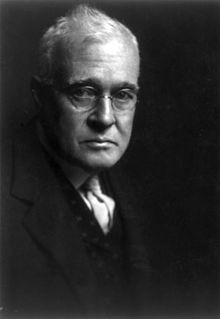Horace Fletcher
Horace Fletcher (* 1849 ; † January 13, 1919 in Copenhagen ), actually a printer's ink and art dealer by profession, was an American nutritional reformer who declared the thorough chewing of food to be an important health-promoting principle. He wrote the saying: " Nature will castigate those who don't masticate " ("Nature will punish those who do not chew thoroughly"). Fletcher was nicknamed "The Great Masticator" because of his strong commitment to pre-digestion by chewing. Even liquids should be "chewed" and saliva.
Fletcher suffered from significant overweight for a while . Before his chewing cure, he weighed 217 pounds (approx. 98 kg) and suffered from various ailments before he discovered his chewing method in 1898, recovered and successfully lost weight. A life insurance company had previously refused to accept him because of his overweight.
Fletcher's followers included Upton Sinclair , John D. Rockefeller, and Franz Kafka . Doctors and scientists such as Prof. Dr. Russell Henry Chittenden and Irving Fisher practiced his eating method.
He spread his beliefs on lecture tours and wrote books and articles about them.
In 1919, at the age of 69, Fletcher died in Copenhagen.
The Fletscher technique
The Fletschern (also Fletchern or Fletcherisieren ) is a particularly thorough chewing technique, which is named after Horace Fletcher. The saliva and thorough chewing will already pre-digest the food and the feeling of hunger should be reduced. The doctor Franz Xaver Mayr was also a supporter of this method.
A few years ago the actor Jürgen Schilling took up this idea again in his book Chew Yourself Healthy . The following text refers to J. Schilling's statements:
When Fletchern the fusion of to taste and chew through saliva (= saliva ) can be achieved. Recommended procedure for this:
- First take small bites and salivate well. Only then should you make at least 40 to 50 chewing movements with your teeth. The bite must turn to a pulp or completely runny. The chewing movements should be counted - at least at the beginning - to ensure full concentration on the food and avoid distraction. The goal is to create 150 to 200 movements with proper exercise until the respective bite is completely dissolved, liquefied and tasted.
- Keep your hands free while chewing, no cutlery and certainly not the next bite in your hands. Residues that cannot be liquefied should not be swallowed, but should be removed from the mouth like cherry stones or fish bones.
- Liquids can also be chewed and “tasted” like a wine taster.
As a result, food only enters the digestive tract as a pulp. Some nutritionists recommend looking at flaking along with the quality of the food as an element of a healthy diet that can help prevent obesity.
literature
- Horace Fletcher: ABC of Snap Shooting: Sporting, Exhibition, and Military. (1880)
- Horace Fletcher: Menticulture or the A – B – C of True Living. (1895)
- Horace Fletcher: Happiness as Found in Forethought Minus Fearthought. (1897)
- Horace Fletcher: The Last Waif, or Social Quarantine: A Brief. (1898)
- Horace Fletcher: Fletcherism: What it is or How I became young at sixty (1913)
Web links
| personal data | |
|---|---|
| SURNAME | Fletcher, Horace |
| BRIEF DESCRIPTION | British food reformer |
| DATE OF BIRTH | 1849 |
| DATE OF DEATH | January 13, 1919 |
| Place of death | Copenhagen |
